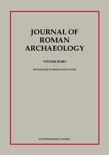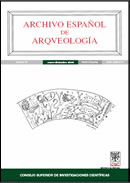
Britannia
metrics 2024
Illuminating Cultural Heritage with Rigorous Research
Introduction
Brittannia is a prestigious journal published by Cambridge University Press that serves as a cornerstone for scholars and enthusiasts in the fields of Archaeology, Classics, and History. With its ISSN of 0068-113X and E-ISSN of 1753-5352, the journal has been committed to disseminating high-quality research and innovative studies since its inception in 1970, addressing vital topics that span cultural, historical, and archaeological dimensions. As a hallmark of academic rigor, it maintains a Q1 ranking in Classics and History and a Q2 ranking in Archaeology (both Arts and Humanities, 2023), reflecting its impact and significance in these disciplines. Although not an Open Access journal, it provides invaluable content for researchers, professionals, and students alike, ensuring that vital insights into ancient civilizations and cultural heritage resonate well beyond the pages of each issue. With upcoming publications scheduled through 2024, Brittannia continues to be an essential resource for anyone invested in the legacies of the past.
Metrics 2024
 0.28
0.28 0.30
0.30 0.40
0.40 14
14Metrics History
Rank 2024
IF (Web Of Science)
JCI (Web Of Science)
Quartile History
Similar Journals

HISTORISCHES JAHRBUCH
Connecting Past and Present Through Scholarly Inquiry.HISTORISCHES JAHRBUCH is a notable German academic journal published by VERLAG KARL ALBER, dedicated to the field of history. With a rich tradition that began in 1941, this journal serves as a platform for scholarly research, exploring various historical themes and methodologies. Although specific impact factors are not readily available, its categorization as Q4 in History indicates its role in the wider academic discourse. HISTORISCHES JAHRBUCH is primarily accessible through subscription, reflecting its commitment to traditional publishing while providing valuable insights for historians, researchers, and students. The journal's coverage, which has converged over selected years including 1980, discontinuing in Scopus, highlights its shifting focus and the evolving landscape of historical study. As a contributing member to the historical scholarship community, HISTORISCHES JAHRBUCH continues to enrich the understanding of historical narratives and foster academic exploration.

Deltion of the Christian Archaeological Society
Uncovering the Past, Shaping the Future of Christian ArchaeologyDeltion of the Christian Archaeological Society (ISSN: 1105-5758, E-ISSN: 2241-2190), published by the Christian Archaeological Society in Athens, Greece, stands as a pivotal source of scholarly work within the realm of Christian archaeology. This journal is dedicated to disseminating high-quality research that promotes the understanding of Christian history, heritage, and archaeological practices. Though it operates under traditional access options, it provides a comprehensive platform for researchers and professionals alike, fostering dialogue and collaboration within the archaeological community. With a commitment to advancing knowledge, the Deltion aims to support both established scholars and emerging voices, reinforcing the significance of archaeology in interpreting religious narratives and cultural contexts. Researchers, students, and professionals interested in the intersections of archaeology, history, and theology will find this journal an invaluable resource in their scholarly pursuits.

Lucentum
Bridging Time through ResearchLucentum is a distinguished open-access journal published by Universidad de Alicante, focusing on the interdisciplinary fields of Archeology, History, and Paleontology. Since its inception in 1982, it has established itself as a vital platform for scholars and researchers to disseminate their findings, contributing significantly to the academic landscape in Spain and beyond. The journal's notable rankings, including Q1 status in History and Q2 in Archeology, reflect its commitment to high-quality scholarship and rigorous peer review. With an impressive impact factor and recognition in Scopus, Lucentum serves as an essential resource for professionals, students, and historians, fostering a deeper understanding of cultural and historical contexts through a wealth of interdisciplinary research. The journal continues to embrace open access, ensuring that critical knowledge is freely available to the global research community.

Journal of Roman Archaeology
Connecting Disciplines: Where Archaeology Meets the ArtsJournal of Roman Archaeology is a premier academic journal published by CAMBRIDGE UNIVERSITY PRESS, dedicated to advancing knowledge in the fields of archaeology, classics, and visual arts. With its established reputation since 2005, the journal occupies a significant place in the scholarly community, featured in the Q1 quartile in both Classics and Visual Arts & Performing Arts categories, as well as Q2 and Q3 in Archaeology, reflecting its high impact and relevance. The journal not only presents rigorous research but also fosters interdisciplinary dialogue among researchers, professionals, and students across related fields. Although it does not operate under an open access model, it provides essential insights and critical analyses that contribute to understanding Roman archaeological practices and artifacts. With an ISSN of 1047-7594 and an E-ISSN of 2331-5709, the Journal of Roman Archaeology is an indispensable resource for anyone engaged in the exploration of ancient cultures, heritage preservation, and archaeological methodologies.

Cuadernos de Estudios Gallegos
Illuminating the Richness of Galicia's CultureCuadernos de Estudios Gallegos is a prestigious academic journal dedicated to the interdisciplinary study of Galician culture and history, published by the CONSEJO SUPERIOR INVESTIGACIONES CIENTIFICAS-CSIC. Since its inception in 1967 and transitioning to an Open Access model in 1991, this journal has become a crucial platform for researchers and scholars seeking to explore the rich historical and cultural tapestry of Galicia, Spain. With an ISSN of 0210-847X and an E-ISSN of 1988-8333, Cuadernos de Estudios Gallegos is indexed in reputable databases, achieving an impressive rank of #664 out of 1760 in the Arts and Humanities History category, placing it in the 62nd percentile for scholarly impact. The journal provides a diverse range of scholarly articles, fostering discussions that enhance understanding of regional history within broader historical contexts. As it strives to contribute to the academic community's knowledge, it particularly invites contributions from both emerging voices and established scholars, making it an essential resource for anyone passionate about the study of Galician heritage.

Annales Instituti Archaeologici
Fostering Scholarly Dialogue in the Archaeological CommunityAnnales Instituti Archaeologici is a distinguished journal published by INST ARHEOLOGIJU, dedicated to advancing research in the field of archaeology. With an ISSN of 1845-4046 and an E-ISSN of 1848-6363, this journal serves as a vital platform for the dissemination of innovative archaeological studies and findings, reflecting the evolving trends and methodologies in this fascinating discipline. Based in Croatia, the journal captures a global audience, emphasized by its Q3 ranking in both Archaeology categories as per the latest 2023 metrics, indicating a solid presence in the academic landscape. Although it does not currently offer Open Access options, its impactful contributions are recognized through its Scopus ranks, where it stands at #137/413 in Archaeology related to Arts and Humanities and #135/354 in Social Sciences. Researchers, professionals, and students interested in the latest archaeological research and its applications will find Annales Instituti Archaeologici to be an invaluable resource, promoting knowledge and fostering scholarly communication within the archaeological community.

Yorkshire Archaeological Journal
Illuminating Archaeological Narratives of YorkshireYorkshire Archaeological Journal, published by Routledge Journals, Taylor & Francis Ltd, stands as a pivotal resource in the field of archaeology, particularly focused on the rich heritage and archaeological research within the Yorkshire region of the United Kingdom. With a dedicated ISSN of 0084-4276 and an E-ISSN of 2045-0664, this journal provides both researchers and practitioners valuable insights into archaeological discoveries, methodologies, and theoretical frameworks. While it holds a Q3 ranking in both Archaeology (Arts and Humanities) and Archaeology (Social Sciences), its contributions remain significant for advancing discussions and knowledge within the discipline. The journal's archival depth, converging from as early as 1980 and continuing robustly into 2024, showcases a commitment to fostering academic discourse and exploration of archaeological heritage. Although it does not currently offer open access, its rigorous peer-reviewed articles make it an essential reference for academics, professionals, and students alike who are eager to deepen their understanding of archaeology and its applications.

OLBA
Cultivating a Community of Archaeological InquiryOLBA is a distinguished journal in the field of archaeology, published by Mersin University Publications Research Center Cilician Archaeology in Turkey. With an ISSN of 1301-7667, this academic journal has been a platform for scholarly discourse from 2009 to 2014 and again from 2016 to 2019, with a recent volume published in 2022. Although it is currently categorized in the fourth quartile (Q4) for both Arts and Humanities and Social Sciences within archaeology, OLBA continues to contribute significantly to the global archaeology community. It serves as an essential resource for researchers, professionals, and students interested in the diverse aspects of archaeological studies and cultural heritage. Despite not being an open-access journal, OLBA strives to disseminate knowledge effectively, aiding in the exploration of ancient civilizations and the rich tapestry of human history. Its Scopus rankings, placing it in the bottom percentiles, demonstrate the ongoing need for the community to support and engage with the journal to enhance its visibility and impact in the archaeological domain.

Archivo Espanol de Arqueologia
Unveiling the past with rigorous research and innovative methodologies.Archivo Español de Arqueología is a prestigious journal published by the Consejo Superior de Investigaciones Científicas (CSIC), dedicated to the field of archaeology and the historical sciences. Since its transition to Open Access in 1991, this journal has been a significant resource for scholars and practitioners in Spain and beyond, ensuring the dissemination of high-quality research to a broad audience. With an impressive Scopus ranking that places it within the top 20% of journals in the disciplines of History and Archaeology, Archivo Español de Arqueología plays a crucial role in advancing academic discourse and promoting innovative archaeological methodologies. The journal has maintained rigorous standards, reflected in its placement within the Q2 and Q3 quartiles, enabling it to establish a reputation for excellence and reliability in archaeological scholarship. Researchers, professionals, and students are encouraged to explore the journal's diverse array of articles from its foundation year of 2009 to the present, enriching their understanding of the past through the latest findings and theoretical advancements in archaeology.

Rossiiskaya Arkheologiya
Elevating Archaeological Discourse for Tomorrow's ScholarsRossiiskaya Arkheologiya, published by IZDATELSTVO NAUKA, stands as a leading academic journal in the field of archaeology and history, renowned for its commitment to advancing scholarly discourse and research in these vital humanities disciplines. With an impressive Impact Factor and a distinguished position as a Q1 journal in both archaeology and history for 2023, it ranks among the top tier of academic publications, reinforcing its reputation within the scientific community. The journal features a diverse array of studies focusing on archaeological methodologies, historical analyses, and cultural heritage, fostering collaboration and knowledge exchange among researchers, professionals, and students alike. While access to its rich repository of insights is through a traditional subscription model, the journal’s contribution to the archaeological narrative not only elevates current research practices but also propels future inquiries within the Russian Federation and beyond. Addressing critical questions and dialogues within its scope from 2017 to 2023, Rossiiskaya Arkheologiya serves as an essential resource for anyone dedicated to exploring the complexities of human history through material culture.